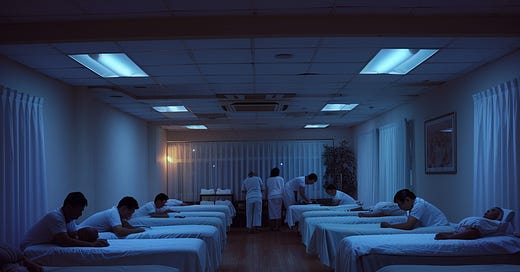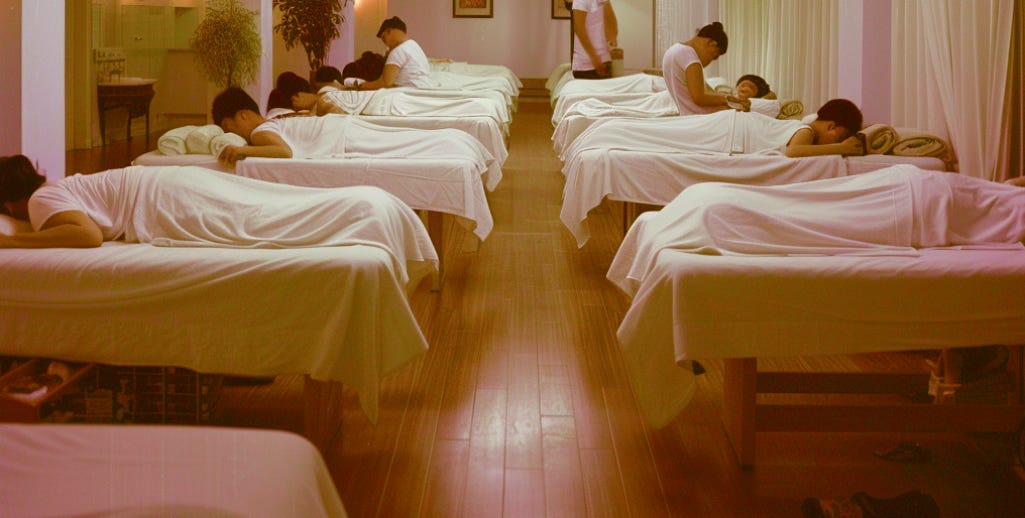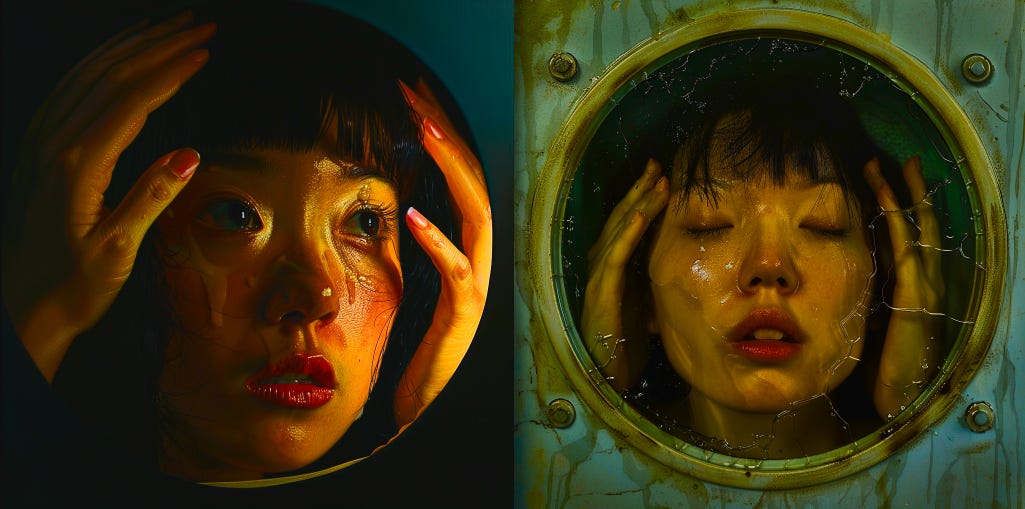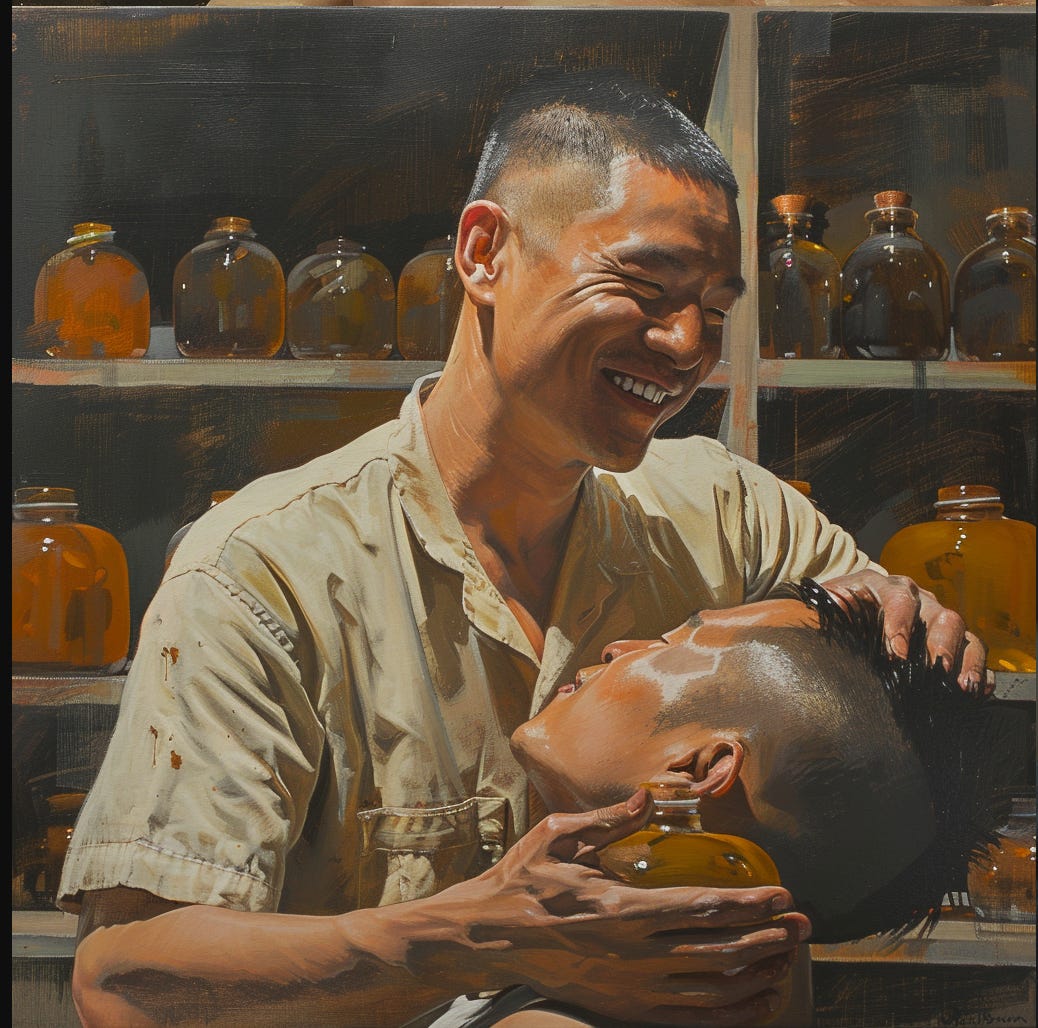On a winter's night, in the blind massage parlor
An experimental memoir-prose, a deeply intimate glimpse into the complexity of the human condition
This is the excerpt of a creative non-fiction piece originally published on issue 214 of the SquawkBack, an online literary journal.
1.
I pushed through the iron gate, the creak echoing off the stairwell's worn walls like a familiar greeting. Ahead, silhouettes of a man and a woman were inching down the stairs, leaning on each other more than the shaky handrail. The hallway's dim light seemed to soak into the man’s weathered skin, giving him a twilight glow.
I recognized the man—Old Gao, and next to him, Fangfang, her arm hooked around his. Despite Fangfang looking three times as big as Old Gao, there was something almost childlike in her dependence on him.
They both waited in place, as I slipped past with a murmured "Excuse me," barely louder than the shuffle of my feet.
The door on the second floor, perpetually left open, led me into a starkly bright world. It was a contrast to the stairwell's gloom, the kind of place that seemed too clean for its own good. Little Wei and Little Zhu were already at work, their movements a silent ballet across the checkerboard floor.
Old Meng was the calm epicenter. His phone conversation as a receptionist was a one-sided mumble that somehow felt as comforting as the worn sofa in the corner. When I asked about getting a massage, his "ah yes, no problem" was delivered with an accent thick enough to chew on. He moved to ready the bed with the practiced ease of someone who'd done this a thousand times before.
“Just now in the stairway I ran into…” I nearly brought up Old Gao and Fangfang, but then it hit me—we'd never officially introduced ourselves. Their names had just trickled into my ears from the chatter of the masseurs I eavesdropped on.
"Ah, they've gone out for veggies. After nine, the market slashes prices on leftovers, a real steal," Old Meng caught on quick. As he spoke, he stumbled over a stool—not tucked away under the bed as it should have been, but standing defiantly in his path.
"Watch out…" I blamed myself for not noticing sooner. But then, it wasn't entirely on me. The masseurs' ease with this space often made me forget their blindness.
They seemed to have tamed the space around them: the neatly hung white sheets, the dishes dripping dry on the rack, the thermos bubbling quietly on the counter. Everything stayed put, like well-disciplined guards waiting for command.
I rushed to smooth a corner of the bedsheet before Old Meng, bending down to slip off my shoes.
As I lay there, Little Wei suddenly turned his head, “Isn’t this the young lady who speaks so slowly?”
Little Wei hailed from Shanxi, about 30 in age, with a buzz cut and a big smile. His thick eyebrows and wide eyes, paired with that expansive grin, made him bloom like a sudden, awkward flower. What set Little Wei apart wasn’t just his looks but his eyes, which, unlike the others, seemed to take in everything with a clarity that belied his blind condition.
The first time I met him, I mistook him for someone who could see as well as I could. Gathering my courage, I had asked him, "Can you see?"
The room erupted in laughter. Old Gao joked, "He's a phony, sneaked in here, kick him out!" Little Wei joined in, "Guaranteed authentic, want to see my blind man's ID card?" He teased, pretending to search his pocket.
"Ah, no need, it just seems like you're looking..." I said, a bit embarrassed but smiling.
He explained, "I have retinitis pigmentosa. Can't see much in the dark, but in the light, I can make out the basics. You’re wearing a long coat, right? Hair to your shoulders?"
Later, curiosity got the better of me, and I looked it up. It turned out to be an eye condition without a cure, one that wouldn’t alter his appearance. It starts with night blindness, and over the years, vision fades away, like leaves dropping with the arrival of autumn.
"Hmm…You popped in here two Fridays back, right around nine at night. Little Zhu worked on you for a solid half-hour," Little Wei concluded his recall as if he had a calendar tattooed on his brain.
"Right, you have an amazing memory," I responded, face down on the massage bed. I hadn’t slept well the night before, and today, a migraine was doing its best to drill through my temples.
"The timer starts now, 60 minutes to go," declared Old Meng's phone.
The blind often max out the speed of their text-to-speech software, warping every message into an auditory blur. To decode it, you have to trade in some of God's other gifts—seeing, for instance.
Old Meng's hands skillfully navigated my neck and shoulders, kneading my muscles and bones with a precision that struck the perfect balance between firmness and gentleness. Those hands, weary from years of toil, resembled a carpenter's tools, occasionally creaking at the joints. Only when they were on the verge of collapse were they briefly set aside for a hasty mend, only to resume their devoted service.
I let his hands guide the dance of my neural network, feeling the points of tension in my body pulse with pain before melting away like effervescence in hot water. It grounded me, more than I cared to acknowledge.
If someone were peering up from underneath the massage table at that instant, they would witness my face contorting in sync with the cadence of Old Meng's wrist movements.
Was this raw, entangled mess of flesh closer to or farther from the kind of beauty I aspired to embody?
2.
"Ow, take it easy, would you? You're turning my grimace into a permanent feature," the male client grumbled from beneath Little Wei's expert hands.
"All part of the service," Little Wei shot back, slapping on the cupping jars with a magician's flair.
"Great, I already started off ugly, and now I'm entering a whole new league of hideous."
"Well, it's not like anybody here can see you."
"Jokes aside, I've got to find a wife somehow."
"Best of luck with that."
"And you? Your turn."
"Me? Oh, same old bachelor, my friend."
"You know, you could try your luck with Russian hotties in the Northeast, right by the border. Or snag yourself a Vietnamese bride—affordable, supposedly sub, and they cook great meals..."
"If she's happy cooking for herself, that's good enough for me," Little Wei countered.
"Why not take a leap then?"
"Some things you just can't rush."
"Ouch... okay, maybe a tad gentler."
"I've been thinking, maybe I'll head south with Old Gao next year, try our luck, see what Guangdong has to offer..."
"Ow, take it easy, would you? You're turning my grimace into a permanent feature," the male client grumbled from beneath Little Wei's expert hands, his tone one of gruff camaraderie typical of men who've shared more than a few laughs.
"All part of the service," Little Wei shot back, slapping on the cupping jars with a magician's flair.
"Great, I already started off ugly, and now I'm entering a whole new league of hideous."
"Well, it's not like anybody here can see you."
"Jokes aside, I've got to find a wife somehow."
"Best of luck with that."
"And you? Your turn."
"Me? Oh, same old bachelor, my friend."
"You know, you could try your luck with Russian hotties in the Northeast, right by the border. Or snag yourself a Vietnamese bride—affordable, supposedly sub, and they cook great meals..."
"If she's happy cooking for herself, that's good enough for me," Little Wei countered, his tone as dry as the Gobi.
"Why not take a leap then?"
"Some things you just can't rush."
"Ouch... okay, maybe a tad gentler."
"I've been thinking, maybe I'll head south with Old Gao next year, try our luck, see what Guangdong has to offer..."
Their back-and-forth kept rolling, easy and familiar. It was like I’d accidentally walked into a living, breathing scene of a Charles Dickens’ rendition of a massage parlor tucked away in the corner of modern Beijing—except nobody was asking for more gruel, and the only thing thick in the air was the scent of medicinal oils and the sound of banter. There I was, stealing a glance into their world through the looking glass, feeling both completely a part of and outside it.
Gradually, under Old Meng's skilled ministrations, the tightness in my muscles began to yield, the piercing edge of my headache blurring into a gentle lull. My thoughts, once sharp and focused, now adrift on the nocturnal current like paper lanterns dissolving into a dream…
3.
Every couple of months, Lili was swept away into the same dream—sometimes it was the Milky Way stretching across the sky, other times it was some unknown marvel. These entities, so alien and incomprehensible, enveloped her in an emotion that felt almost otherworldly.
Last week, she found herself once again wandering under that star-filled canopy in her dreams. The next morning, she shared this with Jackie, who remarked that the pursuit of such emotions might just be the most worthy human endeavor of all. Jackie then shared his own dream—a serene vision of ascending a forested mountain to a vast green plain, where a quaint university lay, stretching to the foot of a distant, taller peak.
Jackie's dream mirrored his temperament—calm and deep. Lili, however, craved something different: a kind of holy chaos in her chest, a fleeting divine revelation that faded with the break of dawn. The next day, she returned to her steel and concrete life, merging into the sea of faces at the office, her days reduced to keystrokes and screen glare. In this synthetic realm, the visceral stirrings of her heart grew fainter, leaving behind nothing but their hollowed-out shells.
She thought about how each generation had its unique burdens to bear, and wondered if this was the price her time demanded. Yet, this duty was paradoxically sculpted into a privilege—desperately coveted yet out of reach for many, which meant she ought to take care of it.
And what, then, did she become?
Her thoughts, actions, even her dreams were not solely her own. They echoed the collective psyche of those who shared her era. She was but one among many, like worker bees from the same hive, indistinct yet integral. Even this idea, it seemed, wasn’t hers alone.
How many out there can truly claim their voice as something of their own?
4.
"How many for you? I got twelve today," Old Meng asked Little Wei.
"Ten, just one more to go," Little Wei responded.
"I'm at one... plus four, and..." Little Zhu seemed to hesitate.
"Ah, make that nine and a half for you, I've kept count," Little Wei chimed in.
"Oh, aren't you something," Little Zhu giggled.
"Your brain's never been much use, better leave the counting to me and Old Meng," Little Wei teased her further.
"You're... really annoying..." Little Zhu pretended to be upset.
In the glow of these brightly illuminated rooms, their hours unfurled—segmented into halves, wholes, and one-and-a-halves. Day melded into day, often weaving into uninterrupted weeks.
What a magnificent and resilient creature is human—to confront time and mark their distinctions within it as such!






